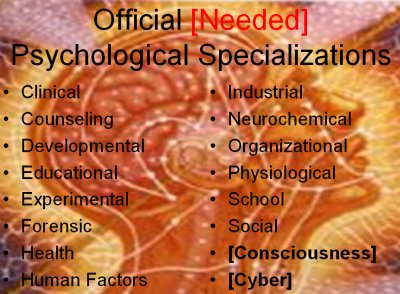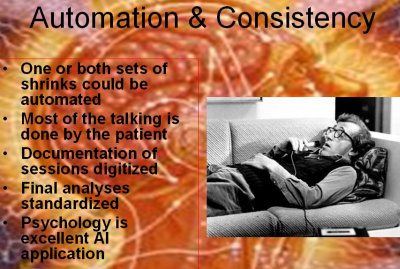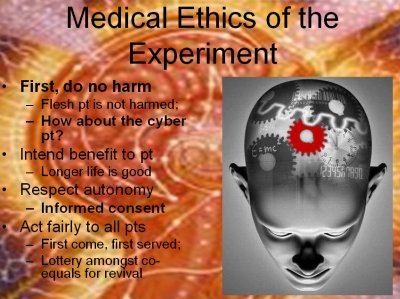An Experiment to Test the Ability of Digitally-Stored Mindfiles to Regenerate the Consciousness from Which It Came
Martine Rothblatt, Ph.D.
Page 3 of 4
For example, our courts use psychiatrists as experts to determine the subjective state of whether an individual is aware of right or wrong. There's no objective way to know, for absolute certainty, that an individual is aware of right or wrong because awareness is something known only to that individual. But we use psychologists as proxy measures that are good enough.
Another reason to use psychologists is that doctors routinely use them to determine the mental state of patients. Is, for example, somebody competent to give informed consent? We have no way to really climb inside somebody's mind and know that for certain, but psychologists are routinely relied upon to give us a proxy for that subjective state.

Image 7: Psychological Specializations
There are a great number of psychological specializations. I believe what is needed is perhaps two new psychological specializations; a specialization of consciousness psychology, and a specialization of cyber psychology.
This need for new specializations is quite consistent with the Kuhnian view of new paradigms requiring scientific revolution, and providing new work for researchers and new entire research fields [1]. Just as Galileo's development of the telescope, and witness of the gallery of satellites orbiting Jupiter gave rise to a new industry of telescope makers, so the hypothesis explained in this presentation, gives rise to a need for a new profession of consciousness psychologists and cyber psychologists. However, in the meantime, I feel quite confident that normal clinical psychologists could handle the empirical measures required by this hypothesis.
A second question to ask is: What is magic about twenty-five hours?
There is nothing magic about the number. However, we have a precedent set in our society by transgender medicine standards. If an individual wishes to change their sex from male to female, or from female to male, it requires surgery. However, surgeons are reluctant to perform this surgery because of the first Hippocratic Principle called: "Do no harm" [2]. So if a surgeon begins to alter an individual's genitals, he or she might be doing harm to that individual because they may regret that surgery. Hence, a protocol was developed whereby anybody wanting transgender surgery must first submit to twenty-five hours of one-on-one counseling with a psychologist over a period of one year. They are actually required to have this counseling with two separate psychologists.
The surgeon will not perform the surgery until he or she receives a written report from two separate psychologists saying that after spending twenty-five hours with the patient over the course of a year, they are convinced that the patient has a consistent, persistent, continuous desire to alter their phenotype [3] into a different sex. This is a precedent that can be used for measuring consciousness because it's been accepted by the psychological and medical fields for the somewhat analogous situation of changing from a male consciousness to a female consciousness. It's not completely different from changing from a flesh consciousness to a cyber consciousness.
 Image 8: Automation & Consistency
Image 8: Automation & Consistency
Another question is that of automation and consistency. Few individuals and fewer researchers could afford Woody Allen's psychology bill, which may well exceed a million dollars over his many decades of therapy. In fact, one or both sets of psychologists could be automated. With therapy most talking is actually done by the patient anyway. Documentation of therapy sessions could be digitized in a form that would allow for final analyses to be standardized.
Psychology is an excellent AI application, and one of the very first early AI applications was in psychology. These AI applications would make it possible for both the assessment of flesh consciousness, and the consistency assessment of ultimate cyber consciousness to be completely automated.
Finally, I'd like to address the medical ethics of the experiment. Medical ethics have four main principles:
First: do no harm.
Second: intend benefit to the patient.
Third: respect the autonomy of each patient.
Fourth: to act fairly to all patients.
 Image 9: Medical Ethics
Image 9: Medical Ethics
With regard to our experiment, no patient is being harmed. Certainly the flesh patient is not being harmed because they are not being altered in any way, they are simply depositing digital reflections of their consciousness to take a site's psychometric test, or deposit digital videos of themselves.
We are not harming the cyber patient because, as of now, there is no cyber patient. If and when there was a cyber-patient, or a purported one for experimental testing purposes, we could avoid harm by providing the cyber patient with abundant access to public communication channels, so that they could express their needs, and to have access to information and social interaction. It might also be important, as part of the experiment, to promise the cyber patient to do whatever is technologically possible to ultimately upload them back into a bio-nano or cellular regenerated body.
Footnotes
1. Kuhn - Thomas Samuel Kuhn ( July 18, 1922 – June 17, 1996) was an American intellectual who wrote extensively on the history of science and developed several important notions in the philosophy of science.
http://en.wikipedia.org/wiki/Thomas_Kuhn April 10, 2008 10:01AM EST
2. The Hippocratic Oath - perhaps the most widely known of Greek medical texts. It requires a new physician to swear upon a number of healing gods that he will uphold a number of professional ethical standards. One of the best known prohibitions is, "to do no harm" (epi dhlhsei de kai adikihi eirxein).
Little is known about who wrote it or first used it, but it appears to be more strongly influenced by followers of Pythagoras than Hippocrates and is often estimated to have been written in the 4th century B.C.E.
Over the centuries, it has been rewritten often in order to suit the values of different cultures influenced by Greek medicine. Contrary to popular belief, the Hippocratic Oath is not required by most modern medical schools.
http://www.nlm.nih.gov/hmd/greek/greek_oath.html April 1, 2008 2:45PM EST
3. Phenotype – n. 1. The observable physical or biochemical characteristics of an organism, as determined by both genetic makeup and environmental influences. 2. The expression of a specific trait, such as stature or blood type, based on genetic and environmental influences. 3. An individual or group of organisms exhibiting a particular phenotype.
The American Heritage STEDMAN’S Medical Dictionary. Boston, New York: Houghton Mifflin Company, 2004: 625.
1 2 3 4 Next Page>